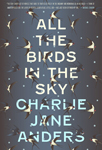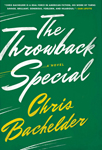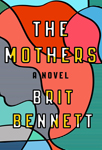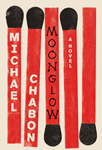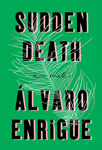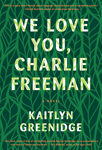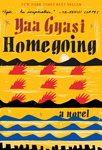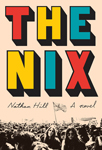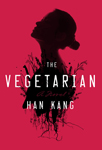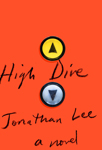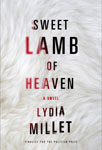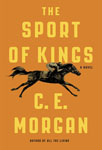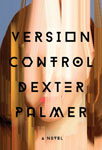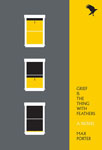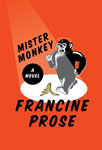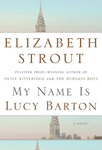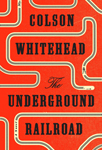by Charlie Jane Anders
Buy it at Powell’s »Will Chancellor: The Amazing Adventures of Kavalier and Clay was the first contemporary novel I fell in love with, and it sketched out what I wanted in my fiction from that point on: international intrigue, linguistic shamanism, and Salvador Dalí in a brass diving helmet. I can only remember finding one flaw in Kavalier and Clay—and it pissed me off to no end. The back flap included the following note about our author: “He lives in Berkeley, California, with his wife, Ayelet Waldman, also a novelist, and their children.” I immediately wished I could unread that. Why foreclose the possibility that I was reading a gay writer describe Sam Clay’s sore fingertips in his lover’s mouth? I understand, theoretically, being in a happy marriage and wanting to celebrate that in print. But get it off my dust jacket, man!
Michael Chabon’s newest novel, Moonglow, begins with an author’s note: “In preparing this memoir, I have stuck to the facts except when facts refused to conform with memory, narrative purpose, or the truth as I prefer to understand it.” Which, when read alongside an advertisement from Chabon Scientific Co. in Esquire, October 1958, two dedication pages, and a misattributed epigraph, drops me into the strange zone of autofiction.
At first I thought this was like having an author bio and thumbnail photo as a footer on every page. Then I thought, no, he’s opening up the exact kind of unknowing I wanted in K&C. Now I’m not sure. Gah!
Moonglow is the result of Mike Chabon listening to his grandfather find voice through the miracle of opioids. I’m going to assume that this Mike fella has nothing to do with the the real Michael Chabon. Rather than sift through the novel and wonder how much corresponds to the author’s biography, I’ll suppose it’s all made up. I’m going to assume that the author never had a grandfather who served in the military—hell, I’ll assume Michael Chabon never had a family. Maybe dropping the “auto” does autofiction a disservice, as these novels call attention to the gap between the author and narrator on almost every page (the insistence of “my grandfather,” “my mother,” “my grandmother”). If it’s bad reading, I apologize. But it’s the only way I can immerse?
Mike Chabon’s grandfather liberates a Nazi labor camp, loses a wife, and serves a long stretch in prison for aggravated assault (telephone cord, neck). This grandfather neither suffers, nor pities fools—I pictured Mike Ehrmantraut from Breaking Bad. As he rambles, he begs Mike, “Put the whole thing in proper chronological order, not like this mishmash I’m making you.” Instead, for extra memoir-ness, Moonglow skips, seemingly at random, through 60 years of the grandfather’s life and relates all the details that might seem trivial to an outsider, like which retiree has a better-seasoned waffle iron.
It works. This reads like nonfiction. But is it compelling?
Ultimately, I don’t care that much about the grandfather—or Mike. To me this book is all grandmother—especially when seen through her daughter’s eyes. We meet the grandmother as she flips tarot cards and tells stories to our young narrator. She’s painted with a different palette: charged aurora greens, purples, almost golden-age Disney. For most of the novel, she’s a fog-covered island that they row around at night. We catch a few glimpses of her mind; we know she’s haunted by the image of a Skinless Horse sitting in a hickory tree.
That Horse eventually gets her. She’s admitted to a mental hospital with an elegant theater, constructed because the institution’s founder believed Greek drama “allowed audiences and actors alike to face the frightful things inside and outside their skulls.” Late in the novel we watch the play she stages, which is a free-associative intuitive feast. And—wow!
Here’s the stuff! This is the parade of primal imagery I first fell in love with. I’d excerpt the entirety of chapter 31 of Moonglow if I could. The mother’s verdict, which I agree with wholeheartedly, is: “It was just the most beautiful thing …”
I see Moonglow as a postcard-sized painting with a frame four feet wide. The canvas at its heart is exquisite and almost enough for me to sign my ballot for Chabon without reading on. When read like this, with the central problem as how to enter the grandmother’s head, Moonglow mirrors not only failing and fragmentary memory, but our fumbling attempts to know someone through words.
But of course we still kill ourselves trying.
In 2014 I reached out to Max Porter via Twitter because he interviewed my favorite writer, Alice Oswald. We kept it brief, and I feel like there’s no real conflict in judging this book for the tournament. I’ve never met him in person. In fact, I hadn’t even seen what he looked like until I picked up Grief Is the Thing With Feathers and—
Fuck!
“Max Porter works in publishing and lives in London with his wife and children.”
I guess everybody lives with their wives and children. Oh but not the dad of our story. His wife has been ripped away before the novel begins. Don’t know about your nightmares, but my greatest fear is instantaneous-no-time-to-process-wiped-out-by a gamma-ray burst/Large Hadron Collider/rogue black hole/aneurism/midnight heart attack/errant bullet death. My second greatest fear is losing someone I love without warning—and it seems like that’s how it always happens.
Death, at least have the decency to knock, otherwise you’ll shred a man like the dad of Grief Is the Thing With Feathers and leave him to explain the world to his poor children. He’ll inevitably fail, because in a just world he’d be permitted a few years to lie on the floor. When Dad fails, a huge stinking crow will hop in and care for his children because “Motherless children are pure crow.” This talking crow finds humans most interesting when they grieve, so he pecks and pecks at the dad’s wound. Why exactly is he here? Probably because Dad is a Ted Hughes enthusiast working on a book called Crow on the Couch. But don’t get the wrong idea, there’s a real six-foot talking crow in this book. Two boys, one Dad, one Crow.
Let’s talk about Porter’s Crow. He’s not quite the same Crow you’ll find in Hughes’s poems. Hughes’s Crow is a trickster, but he is a questing trickster trying to discover his creator, undergoing travails, stab-footing into his next disaster. The crow in Grief Is the Thing With Feathers is domestic, not mythic; he seems to remember pain, and knows therefore that he needs to laugh hardest at what’s most painful. To be visual about it, Hughes gives us a sharp, ink-black, etched caricature of Crow. Porter gives us a Crow painted by Francis Bacon. There are strange colors here. Bulbous warp and gasoline glistens in those black feathers.
I read Ted Hughes’s Crow poems—something only necessary if you want to squirrel with hidden meanings rather than immerse yourself in the book, i.e. if you want to miss the whole fucking point of Grief Is the Thing With Feathers—as someone trying to grapple with the unthinkability of his mortality and accept the possibility of death and nothingness. Porter’s Crow does the opposite; he teaches how to accept the possibility of living.
The title is a telling vandalization of the Emily Dickinson line “Hope is the thing with feathers.” In Dickinson, this bird appears in rough times but asks nothing “—of me.” The circumstances here are similar, sure. The real genius, though, is replacing unending, undaunted Hope with determined Grief. That’s the kind of move that probably had lots of readers who’ve suddenly lost someone jabbing at the page with an index finger and saying, “Yes. That’s it exactly, you brilliant fucker!” Here’s how Dad puts it:
Moving on, as a concept, is for stupid people, because any sensible person knows grief is a long-term project. I refuse to rush. The pain is thrust upon us let no man slow or speed or fix.
And here Moonglow and Grief Is the Thing With Feathers are in tension. The grandfather’s dream of taking his wife to a moon colony where, “230,000 miles from the stench of history, there was no madness or memory of loss,” is at its root an escapist fantasy. Escaping a box of your own devising was the perfect device for Kavalier and Clay—and a great metaphor for the craft of novel writing—but there’s no escape when reality sloshes you with a bucket of horrible. Uncle Ray, a major character (who transforms from rabbi to rapist pool hustler off-screen) dies in a footnote. I’m of the opinion that no one ever dies in a footnote. And although avoiding some unpleasantries seems consistent with Moonglow’s “narrative purpose,” that appeal to my intellect doesn’t touch Grief Is the Thing With Feathers’s raw-heart insistence that life is what you live through.
Pair two novels and you’re going to see a few slant rhymes. One of the strange coincidences is that both books mention the possibility of creating a new mother. It’s a minor sentence in Chabon, used to different effect entirely and therefore grossly unfair of me to put next to a central passage in Grief Is the Thing With Feathers, but I’m going to do it anyway as I think the depth of feeling in Porter explains my decision better than I could.
Chabon: “A widowed rabbi unraveled his tallis and used the thread and some of his dead wife’s clothes to sew their child a new mother, a soft golem silent as a raincoat.”
Porter: “The telly went off and Crow suggested a game. ‘You two boys,’ he said, ‘must each build—here on the floor—a model of your Mother. Just as you remember her! And whichever of you builds the best model will win. Not the most realistic, but the best, the truest. The prize is this…’ said the Crow, stroking their shampooed hair… ‘the best model I will bring to life a living mother to tuck you up in bed.’”
The rest of that scene is devastating. I recommend reading it aloud in the bathtub.
Grief Is the Thing With Feathers shows how much life fits inside any moment. It’s short. There’s a lot of blank space to process what you’re reading. Each scene seems chosen with great care, but also with a reckless laugh that comes from Crow. We go as deep and as close as possible to each instant—with an intensity of feeling as if the entire thing is going to be suddenly ripped away. That’s all I really want from a book, a couple perfectly full moments.
In the end, I choose depth over breadth. Porter fit a whole novel into a sentence of Chabon’s.
I appreciate the surrealism of Chabon’s Skinless Horse, but will forever hear the caws of that “God-eating, trash-licking, word-murdering, carcass-desecrating math-bomb motherfucker” of a Crow.
Grief Is the Thing With Feathers advances. With a wraaaaaaw that could rattle a rooster.
Match Commentary
By Portia Turner & Kyle Curry
Kyle Curry: Hello ToB world, I can’t believe I get to say that! Hi Mom! It is just such an honor to be here courtside for what I think is one exceptional matchup. Right, I guess we should introduce ourselves. I’m Kyle.
Portia Turner: And I’m Portia. I am so incredibly excited to be here. Does this make me an official book world person? I read book blogs religiously so being here really makes me feel like I have made it!
Kyle: Portia and I are bringing you this commentary straight from the windy city of Chicago, where we both work for The Book Cellar, a Chicago bookstore institution for the past 13 years. Portia, I know there are a lot of bookstores out there, but I think the fact that you can drink wine while you shop really makes ours special. Speaking of, I think we may need a glass right now!
Portia: Here, Kyle. I’ve got some cabernet. It’s got a full body and—wait, we’re here to talk about books, not wine. I’m so used to talking about them together. Wine and books go together like—well, everything sounds too cliché and this is a classy commentary! No room for clichés here!
Kyle: Similar to our esteemed Judge Chancellor, Kavalier and Clay was a seminal book in my reading life. I grew up alternating between hardcore sci-fi/fantasy, comic books, and Shakespeare. So reading a book that combined so many topics I loved and was so powerfully written changed my perspective of the things books could do. After that, Chabon has had a fair amount of carte blanche as an author for me.
Portia: There is always a lot of buzz around a new Chabon novel and Moonglow was no exception. Grief Is the Thing With Feathers, on the other hand, was a book I knew nothing about until I saw you write a recommendation for it.
Kyle: And I only found out about it thanks to one of my reading soul mates, Tim, who texted me out of the blue demanding that I get a copy of Grief Is the Thing With Feathers. Boy was he right. I think I read it in about two sittings, mostly giggling like a madman at Crow’s shenanigans (especially his nightmares) until some proudly touching moment of human sadness would confront me on the page. It’s nice it is so short because I did often have to set it down and grapple with what I had just read.
Portia: Reading Grief Is the Thing With Feathers in the frazzled mental state I was in made it overwhelming, but in a good way? I found that it wasn’t bingeable because it really took a lot out of me, but I still looked forward to picking it up each time. I loved each of the voices so much and looked forward to each of their sections. This actually, leads right into my problem with Moonglow. I found that there were parts of the book that I cared about more than others. I really had to push myself through the war passages. They all felt like something I had read or seen in a movie before in contrast with the grandmother’s story, which was new and interesting. But we only got glimpses of that. Oh man, I am so conflicted about that book.
Kyle: Yeah! Despite my love for Chabon, I am totally on Will’s side. Grief Is the Thing With Feathers is a stronger book and does some far more interesting things. I mentioned my love of Shakespeare earlier and reading Crow’s more poetic chapters was like language crack for me. Like Judge Chancellor, I recommend reading them out loud! The whole book feels slightly heightened in its language. It reminded me a lot of my experience reading Brand New Ancients by Kate Tempest. Can we call it “poetic-fiction” perhaps?
Portia: I think that’s the perfect word. While I was reading, I kept trying to define what it was. Was this passage poetry or prose? Is this really just a long poem or does it work more as a novel? Once I was able to silence these thoughts, I realized that this book was great because it really played with the lines of form and genre, using the strengths of each to elevate the whole.
Kyle: And the characters were very human! I cared about all four characters in Grief Is the Thing With Feathers way more than any in Moonglow, which I had a bit of inevitability to me. He told us at the top where it was all going. I suppose that makes sense in that autofiction style, but Chabon’s time jumping seemed to take a lot of the drive out. I also want Crow to be my best friend. Maybe we can offer him a job at the Book Cellar?
Portia: I actually feel like all of the characters in both these books would make great Book Cellar employees! For all my frustrations, Chabon did a great job of creating smart, interesting characters. I never found myself yelling, “Ugh, why are you so stupid, why are you doing this?” at any of the characters, which I find myself doing often when reading. Speaking of stupid, my glass is empty. Any more wine?
Kyle: Well, this bottle appears to be empty, which is the usual signal that we ought to wrap this up. Think Moonglow will pop up as a Zombie pick at all?
Portia: While Moonglow wasn’t my favorite read this year, I’m surprised to see a book by such a beloved author gone so soon. I was really expecting it to get farther in the battle. If it does come back, I hope it doesn’t bring the skinless horse with it!
Kyle: Portia, as always it is a pleasure to force other people to listen to us talk about books.
Portia: To all of you out there in ToB land, make sure you come by and visit us at the Book Cellar. Mention the ToB and you can have 10 percent off your books plus all the water you can drink!
Kyle: Signing off from Chicago, I’m Kyle.
Portia: And I’m Portia.
Kyle and Portia: And don’t forget to shop indie bookstores!
Kevin Guilfoile: Many thanks to Portia and Kyle from The Book Cellar, one of my favorite bookstores in one of my favorite neighborhoods in my favorite town.
John Warner: And thanks to Will Chancellor, who is representative of one of my favorite aspects of the ToB: a community where Will can go from fan to competitor to judge. As Portia Turner says, there really is a real-life “book world” and we’re all invited inside.
Well, back to boring old us tomorrow, Kevin, and a matchup I’m excited about, with Lydia Millet’s Sweet Lamb of Heaven up against Homegoing by Yaa Gyasi. Author Caille Millner will be our judge.



